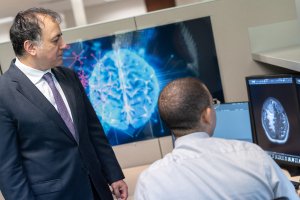por
John R. Fischer, Senior Reporter | April 18, 2023

UF Health will use Nuance's AI technology to optimize the development of radiology reports. (Photo courtesy of UF Health)
University of Florida Health is integrating Nuance Communications AI technologies into its radiology reporting and workflow processes.
Together, they plan to develop radiological voice recognition tools to improve report accuracy and reduce the amount of time needed to produce them. UF Health will also implement Nuance’s Precision Imaging Network, a single, data-driven platform that hosts, integrates and manages AI services within radiology workflows to allow radiologists to convey crucial findings to primary care physicians faster.
UF Health says these workflow enhancements will create higher quality, cost-effective processes for improving clinical outcomes, financial performance, and efficiency, from screenings to follow-up appointments.



Ad Statistics
Times Displayed: 123124
Times Visited: 7135 MIT labs, experts in Multi-Vendor component level repair of: MRI Coils, RF amplifiers, Gradient Amplifiers Contrast Media Injectors. System repairs, sub-assembly repairs, component level repairs, refurbish/calibrate. info@mitlabsusa.com/+1 (305) 470-8013
“Radiologists are under more and more pressure to interpret progressively complex medical images with increasingly sick patients. By streamlining the reporting, a system like this helps them focus on the most rarefied and special parts of what they do — focusing on diagnosing the patient’s medical condition,” said Dr. Patrick Tighe, an anesthesiology professor and associate dean for AI application and implementation in the UF College of Medicine, in a statement.
UF Health and Nuance have already deployed a clinical platform, which they will use to assess the functionality, implementation and efficacy of new algorithms, and will work together to improve the quality and efficiency of radiological interpretation reporting.
The Radiomics and Augmented Intelligence Laboratory at UF Health’s Normal Fixel Institute for Neurological Diseases will develop the system, with clinical testing to be conducted at UF Health Shands Hospital.
As AI continues to become more sophisticated, technologies like this could eventually be used to track recommendations for patient safety and appropriate follow-up care, says Dr. Reza Forghani, a professor of radiology and artificial intelligence in the UF College of Medicine and vice chair of AI, in a statement.
“These are leading-edge technologies that we will help to adapt and perfect for more future, widespread use,” he said.

